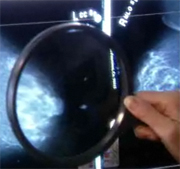- Could Your Grocery Store Meat Be Causing Recurring UTIs?
- Are You Making This Expensive Thermostat Error This Winter?
- Recognizing the Signs of Hypothyroidism
- 10 Strategies to Overcome Insomnia
- Could Artificial Sweeteners Be Aging the Brain Faster?
- Techniques for Soothing Your Nervous System
- Does the Water in Your House Smell Funny? Here’s Why
- Can a Daily Dose of Apple Cider Vinegar Actually Aid Weight Loss?
- 6 Health Beverages That Can Actually Spike Your Blood Sugar
- Treatment Options for Social Anxiety Disorder
2 Genetic Variants for Breast Cancer Identified


Scientists say they have identified two new genetic variants that are associated with an increased risk of breast cancer.
The two variants apparently affect the KLF4 gene, which is believed to help control the way cells grow and divide, and they are most strongly linked with estrogen receptor-positive breast cancer, the most common form of the disease.
Women with one of the genetic variants are 12 percent more likely to develop breast cancer, and those with the second variant have a 9 percent increased risk. The variants increase the risk of estrogen receptor-positive breast cancer by 14 percent and 11 percent, respectively, the researchers said.
The discovery came after the researchers analyzed the DNA of 100,000 women worldwide. Their findings are published Feb. 4 in the journal Human Molecular Genetics.
“Our study zoomed in on an area of our genome that we knew was linked to breast cancer risk, and has identified two new genetic variants that add significantly to our knowledge about the genetic causes of the disease,” study leader Dr. Nick Orr, from the Institute of Cancer Research in London, said in an institute news release.
He added, “The more genetic risk factors for breast cancer we discover, of which there are currently more than 80, the more accurately we will be able predict who is at risk of getting the disease. Ultimately this will be vital for designing preventative strategies against breast cancer.”
More information
The U.S. National Cancer Institute has more on breast cancer.
Source: HealthDay
Copyright © 2026 HealthDay. All rights reserved.










